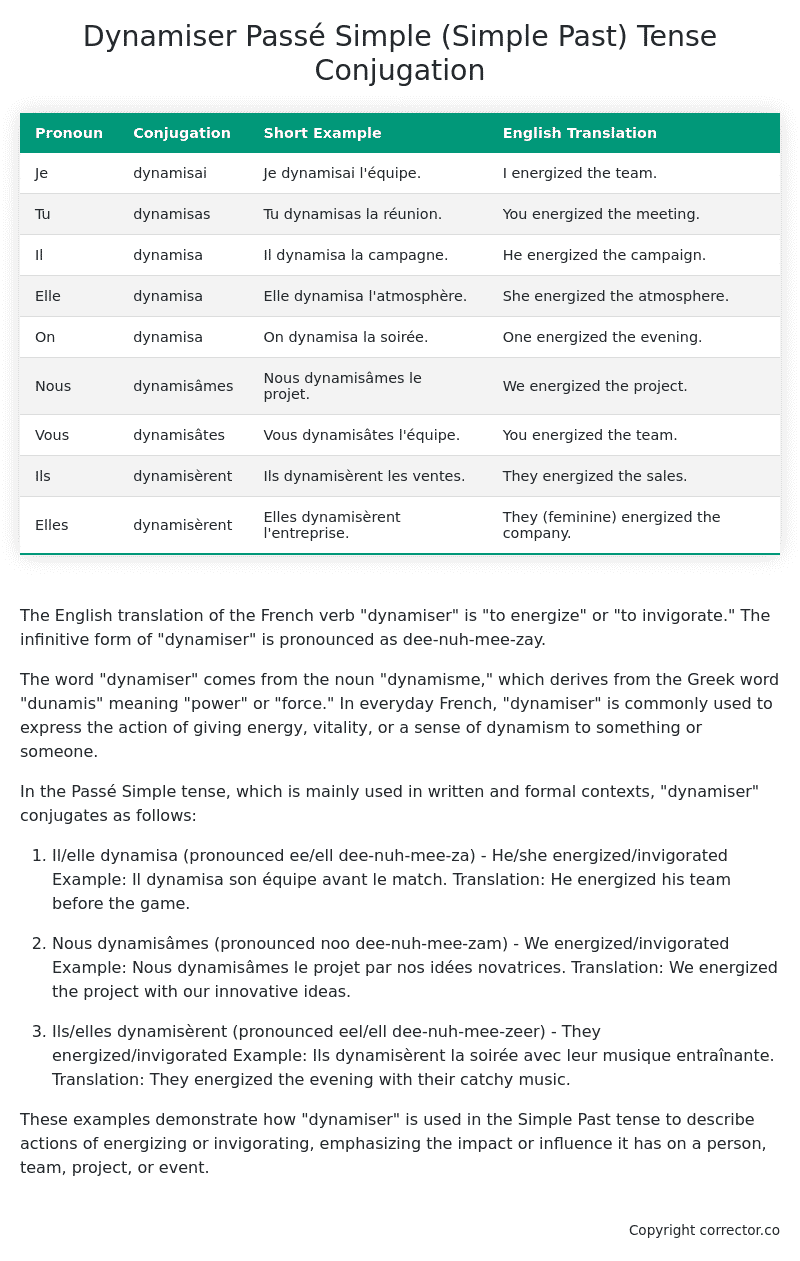Passé Simple (Simple Past) Tense Conjugation of the French Verb dynamiser
Introduction to the verb dynamiser
The English translation of the French verb “dynamiser” is “to energize” or “to invigorate.” The infinitive form of “dynamiser” is pronounced as dee-nuh-mee-zay.
The word “dynamiser” comes from the noun “dynamisme,” which derives from the Greek word “dunamis” meaning “power” or “force.” In everyday French, “dynamiser” is commonly used to express the action of giving energy, vitality, or a sense of dynamism to something or someone.
In the Passé Simple tense, which is mainly used in written and formal contexts, “dynamiser” conjugates as follows:
-
Il/elle dynamisa (pronounced ee/ell dee-nuh-mee-za) – He/she energized/invigorated
Example: Il dynamisa son équipe avant le match.
Translation: He energized his team before the game. -
Nous dynamisâmes (pronounced noo dee-nuh-mee-zam) – We energized/invigorated
Example: Nous dynamisâmes le projet par nos idées novatrices.
Translation: We energized the project with our innovative ideas. -
Ils/elles dynamisèrent (pronounced eel/ell dee-nuh-mee-zeer) – They energized/invigorated
Example: Ils dynamisèrent la soirée avec leur musique entraînante.
Translation: They energized the evening with their catchy music.
These examples demonstrate how “dynamiser” is used in the Simple Past tense to describe actions of energizing or invigorating, emphasizing the impact or influence it has on a person, team, project, or event.
Table of the Passé Simple (Simple Past) Tense Conjugation of dynamiser
| Pronoun | Conjugation | Short Example | English Translation |
|---|---|---|---|
| Je | dynamisai | Je dynamisai l’équipe. | I energized the team. |
| Tu | dynamisas | Tu dynamisas la réunion. | You energized the meeting. |
| Il | dynamisa | Il dynamisa la campagne. | He energized the campaign. |
| Elle | dynamisa | Elle dynamisa l’atmosphère. | She energized the atmosphere. |
| On | dynamisa | On dynamisa la soirée. | One energized the evening. |
| Nous | dynamisâmes | Nous dynamisâmes le projet. | We energized the project. |
| Vous | dynamisâtes | Vous dynamisâtes l’équipe. | You energized the team. |
| Ils | dynamisèrent | Ils dynamisèrent les ventes. | They energized the sales. |
| Elles | dynamisèrent | Elles dynamisèrent l’entreprise. | They (feminine) energized the company. |
Other Conjugations for Dynamiser.
Le Present (Present Tense) Conjugation of the French Verb dynamiser
Imparfait (Imperfect) Tense Conjugation of the French Verb dynamiser
Passé Simple (Simple Past) Tense Conjugation of the French Verb dynamiser (You’re reading it right now!)
Passé Composé (Present Perfect) Tense Conjugation of the French Verb dynamiser
Futur Simple (Simple Future) Tense Conjugation of the French Verb dynamiser
Futur Proche (Near Future) Tense Conjugation of the French Verb dynamiser
Plus-que-parfait (Pluperfect) Tense Conjugation of the French Verb dynamiser
Passé Antérieur (Past Anterior) Tense Conjugation of the French Verb dynamiser
Futur Antérieur (Future Anterior) Tense Conjugation of the French Verb dynamiser
Subjonctif Présent (Subjunctive Present) Tense Conjugation of the French Verb dynamiser
Subjonctif Passé (Subjunctive Past) Tense Conjugation of the French Verb dynamiser
Subjonctif Imparfait (Subjunctive Imperfect) Tense Conjugation of the French Verb dynamiser
Subjonctif Plus-que-parfait (Subjunctive Pluperfect) Tense Conjugation of the French Verb dynamiser
Conditionnel Présent (Conditional Present) Tense Conjugation of the French Verb dynamiser
Conditionnel Passé (Conditional Past) Tense Conjugation of the French Verb dynamiser
Conditionnel Passé II (Conditional Past II) Tense Conjugation of the French Verb dynamiser
L’impératif Présent (Imperative Present) Tense Conjugation of the French Verb dynamiser
L’impératif Passé (Imperative Past) Tense Conjugation of the French Verb dynamiser
L’infinitif Présent (Infinitive Present) Tense Conjugation of the French Verb dynamiser
L’infinitif Passé (Infinitive Past) Tense Conjugation of the French Verb dynamiser
Le Participe Présent (Present Participle) Tense Conjugation of the French Verb dynamiser
Le Participe Passé (Past Participle) Tense Conjugation of the French Verb dynamiser
Struggling with French verbs or the language in general? Why not use our free French Grammar Checker – no registration required!
Get a FREE Download Study Sheet of this Conjugation 🔥
Simply right click the image below, click “save image” and get your free reference for the dynamiser Passé Simple tense conjugation!

Dynamiser – About the French Passé Simple (Simple Past) Tense
Formation
Usage
Narration
Historical Context
Interactions with other tenses
Passé Composé
Imparfait
Conditional and Subjunctive
Summary
I hope you enjoyed this article on the verb dynamiser. Still in a learning mood? Check out another TOTALLY random French verb conjugation!


